Update! New dates for A Day with Shopify have been announced. We’ll stop in five cities across five countries to give you a full day of Shopify Partner-specific networking and programming. Check out the details.
Last December, roughly 100 Shopify Partners and Experts from around Europe gathered in the heart of Bristol, United Kingdom, on the historic ss Great Britain (once the longest passenger ship in the world), for a day of networking, learning, and celebrating our ever-growing partner ecosystem.
Attendees came from the UK and Ireland, Germany, the Czech Republic, France, Finland, Spain, Italy, Iceland, Ukraine, and even as far as Canada to learn from their peers, share stories, and hear directly from top Shopify executives. This included Shopify’s COO Harley Finkelstein, Director of User Experience Monika Piotrowicz, and two unique creatives/Shopify merchants who spoke the night before the event.
The first of its kind, A Day With Shopify was a response to our Partners and Experts across Europe who’d been asking for an event that was more comprehensive than our meetups, and also recognized the fact that the UK is the second biggest Shopify market.
“We were meeting many of our partners for the first time, which is amazing,” said Joel Bronkowski, Shopify International for EMEA. “It’s really nice for us to be able to introduce partners to other partners, and allow them to learn from each other, and ultimately grow.”
Steve Deckert, co-founder and director of business development at loyalty program company Sweet Tooth, says it was a no-brainer to travel all the way from Canada.
“When we first heard about A Day With Shopify we knew we needed to book our flights,” he explained. “Community is the backbone of any ecosystem, and A Day With Shopify allowed us to meet the awesome people that make up this fast growing community.”
Strange Bingo
The evening before A Day With Shopify, a pre-event mixer called Strange Bingo was hosted, and featured two highly inspiring and entertaining talks on former cargo ship, The Thekla (now a legendary music venue).
It was a great chance to mingle with the local creative scene, meet fellow attendees (60 per cent of the audience was made up of A Day With Shopify delegates), and hear from two creatives, who are extremely successful Shopify merchants themselves.

Gavin Strange, senior designer for Aardman Animations, showcased some of his creative work, including a range of side projects he creates under the alias Jam Factory.
Befitting the venue, he then walked the audience through his favorite ten rap songs that inspire him. Rap was also a theme in Mr Bingo’s talk, who made a rap video to promote a KickStarter campaign to fund a book of his hugely popular Hate Mail project (now available on his Shopify store). In his own inimitable way, he walked through his 37 lessons in life (and work). Truly inspiring.
For all the photos of Strange Bingo, see Marc Thiele’s photo album.
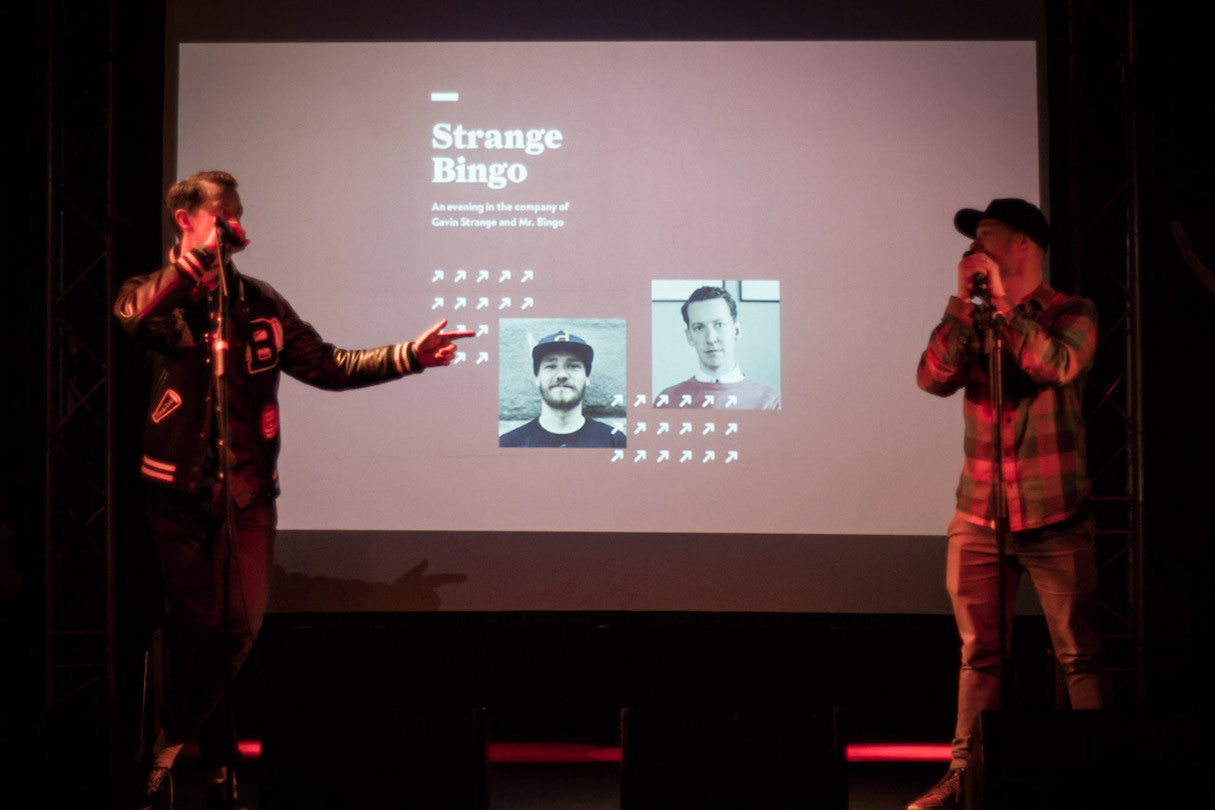
A Day With Shopify
The main event featured six sessions that shared lessons, successes, and challenges in ecommerce, and specifically from within the Shopify Partner community.
Shopify keynote
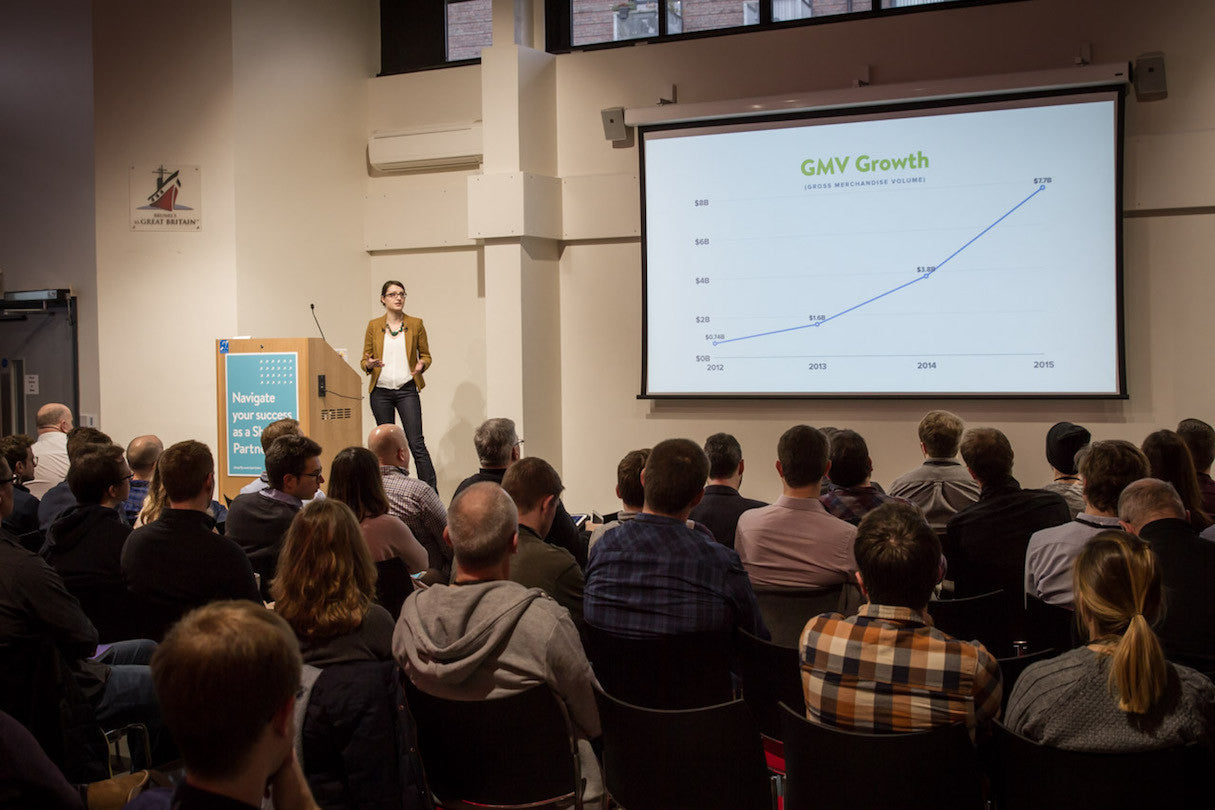
Monika Piotrowicz, Shopify’s Director of UX, kicked off proceedings with an overview of the latest Shopify stats, news, and product developments to support partners.
Shopify now has more than 16,000 partners, 170 Experts, and 10 Shopify Plus Partners in Europe, the middle east, and Africa (EMEA), and the Shopify App Ecosystem is equally vibrant. There are more than 1,500 apps in the Shopify App Store, more than 1,000 unique app developers, and more than 33,000 app downloads in total.
Piotrowicz then discussed the many improvements on the Shopify platform over the last year that benefited partners and merchants, including the Shopify Card Reader, the JS Buy SDK, and Shopkey.
Session: 'Building a Web Agency: Specialization, Scaling, and Culture'

Piers Thorogood, co-founder of We Make Websites, talked about the lessons he learned while growing their London agency.
“The best decision we ever made as an agency was to specialize,” he explained. “Choosing a niche made everything simpler; our marketing became much easier as we had a clear target market, sales were easier to close as our clients all shared the same problems, and building websites became easier as we could re-use more of our code.”
Specialization and finding your own niche is the key to becoming an expert, and standing out from the crowd. Choose a vertical you want to cater to (for example, fashion) and then define your audience. For We Make Websites the ideal client at the time was a London-based startup or small business that was already aware of Shopify, and who wanted to sell physical, design-focused products online.
Once you’ve defined your audience, put a lot of effort into content marketing and make yourself visible by blogging, meetups, speaking engagements, videos, and podcasts. In order to scale, We Make Websites hired marketers before production staff, and built relationships that would foster leads (partnering with an SEO agency, for example). One way to build recurring revenue, Thorogood argued, is to just double your prices, which worked wonders for We Make Websites.
“One of the key things we've done that has driven our growth — and kept things under control as we've grown — is turning everything into a process. Whether it’s creating proposals, designing and building websites, or hiring new staff, we have a process for everything — and we constantly refine it.”
Culture is also really important to build a successful agency and something that We Make Websites neglected initially, Thorogood admitted. Building a culture where people care about and enjoy what they do, however, is vital for building a successful agency.
Define your values and stick to them, Thorogood suggested. Implementing them won’t be easy, and you can’t please every client, sometimes you just have to get rid of a client. Improve and develop your team by conducting post-project reviews, monthly one-to-ones, design and code reviews, taking the team out to celebrate success, and giving them 10 per cent of their time to work on side projects.
You might also like: 7 Years of Business. 7 Pieces of Advice. How ‘We Make Websites’ Became #1
Session: ‘Around the World in Four Apps: A Journey Into the Shopify App Ecosystem’
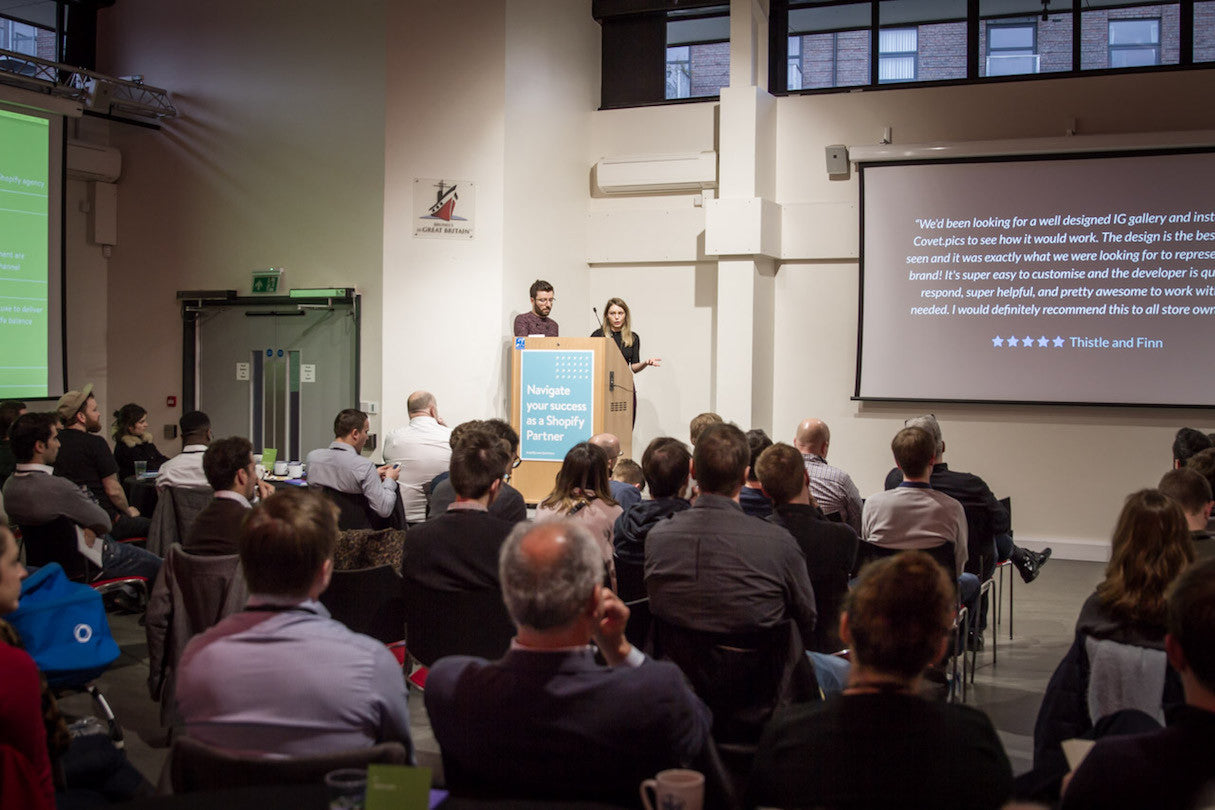
Dom and Djuro from Space Squirrel showed the audience that you can travel the world and work remotely, while producing successful Shopify Apps with very limited resources, like their image compression and optimization app Crush.pics.
"It’s important that, as an app developer, you’re present in both your app’s backend and at the front,” Djuro explained. “What we mean by this is, once you develop and launch the app, you must stay with it and improve on it. How? Listen to your user’s feedback and see where you can expand or simplify. That is how you create a wholesome service that will result in higher sales both for your users and for yourself."
Take your time and be patient. Commit to quality and simplify your apps. It might lead to them being featured on the Shopify App Store, which can cause a big spike in traffic. Also cross-promote your apps to help customers discover other products you’ve created.
Finally, you should see apps as a service, not a product, they argued. Personalize your support and get to know your users, they recommended, so you can talk to users in the same voice. Be visible, provide value, and — crucially — ask for a review whenever you can (e.g. when you respond to an email or close a support ticket).
Session: ‘How Statement is Revitalising Independent Retail With Multi-Channel’
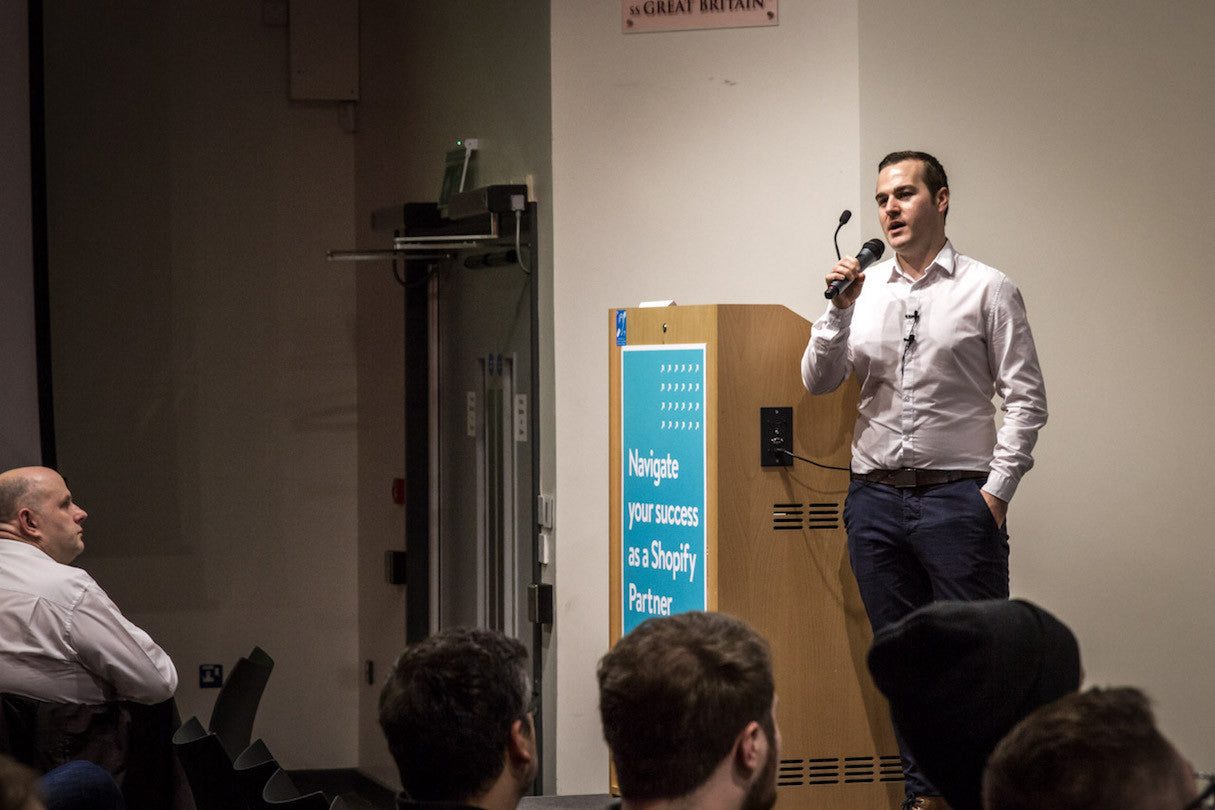
A recurring theme of the event was the rapidly changing ecommerce environment. It was especially covered by Dan Conboy from Statement, who talked about how multi-channel retail revitalizes independent businesses.
“Independent retailers are the soul of our villages, towns, and cities,” he argued. “But many need help to adapt and offer the multi-channel service that today's consumer expects.”
There’s a long way to close the gap between large and independent multi-channel. Also, independent retailers may need different engagement opportunities, compared to traditional web-only merchants. Shopify’s point-of-sale system fits in with the needs of independent retailers, and enables them to build the shop of the future, that’s iPad or hardware-driven, but remains a significant change for most retailers who need face-to-face training.
“Our research has shown that traditional retail businesses don't always have the tools and skills to be able to make the leap from 'bricks' to 'bricks and clicks,'” Conboy explained. “Many independent retailers we have spoken with, told us that they were confused by the options available to them, and this made them hesitate in their decision making process to invest in new ways of working. Key questions like ‘which ecommerce platform should I use?' and ‘which EPOS system is right for me?' were common.”
“We found that the best thing to do was to have an open and honest conversation; to build trust and take time to get to know the business. Once this happened, we were able to audit the business' current and future plans and work out if Shopify was the right way forward for them, both online and in-store through POS,” Conboy continued. “Thankfully in most instances it was, but when it wasn't the right fit, we made sure we explained why, and tried to provide some alternative options to help them move forward.”
Session: ‘How Shopify Enables NoirLuxe to Deliver Success to Their Clients and Create a Work/Life Balance’
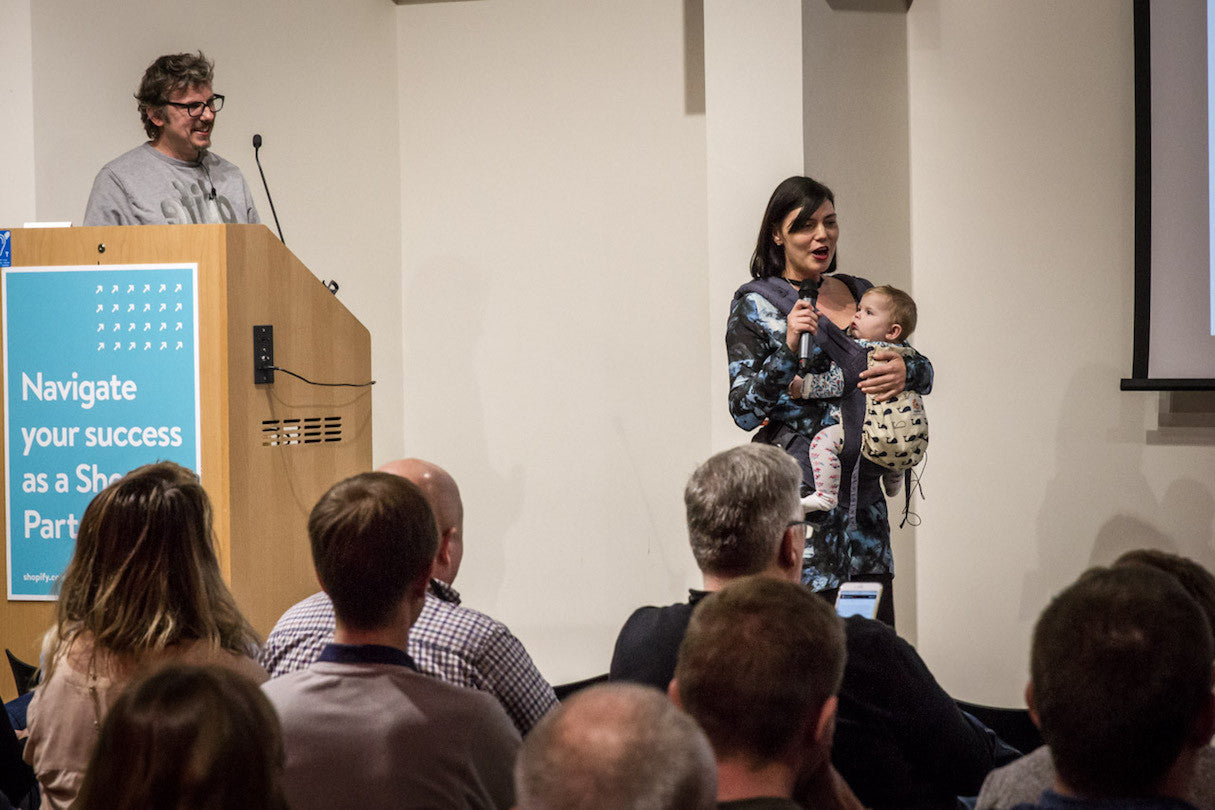
The rapidly changing ecommerce environment was also the focus of a presentation by Amanda May and Tim Daly from NoirLuxe, who did the whole presentation with their little baby daughter on stage. Their children are a big part of their lives, yet they manage to launch three Shopify sites a week, on average.
"The beauty of Shopify is that it gives both the developers and the clients the flexibility they need to have the kind of lifestyle they want,” Tim said. “For some, this means having time for the kids, and for others it's getting a dream off the ground, whilst working on other things at the same time."
"We always take time to get to know our clients as people and what motivates them as entrepreneurs. Understanding what is important to our clients helps us to deliver both a great website, and the sense that they, and their dream, are being looked after. We estimate that for every site we build, we get another three through referrals, and we put this down to our personal touch," Tim added. "It's a privilege to know our clients and to be a part of their successes. We are so grateful that through Shopify we can become a part of their stories."
You might also like: Announcing Shopify’s Build a BIGGER Business Competition
Session: ‘Q&A With Harley Finkelstein’
One of the clear highlights of the day was the live-streamed Q&A with Shopify COO Harley Finkelstein, who called the Partner Program his “professional pride and joy.”
He explained that we’ve just scratched the surface with this community, and added that it would be an amazing personal win if a Shopify Partner went public with their business.
The next couple of years then will be the most exciting in ecommerce, he reckoned, stressing how more and more companies now sell directly to the customer, and how technological advances have made it a lot easier for merchants to run and grow a business.
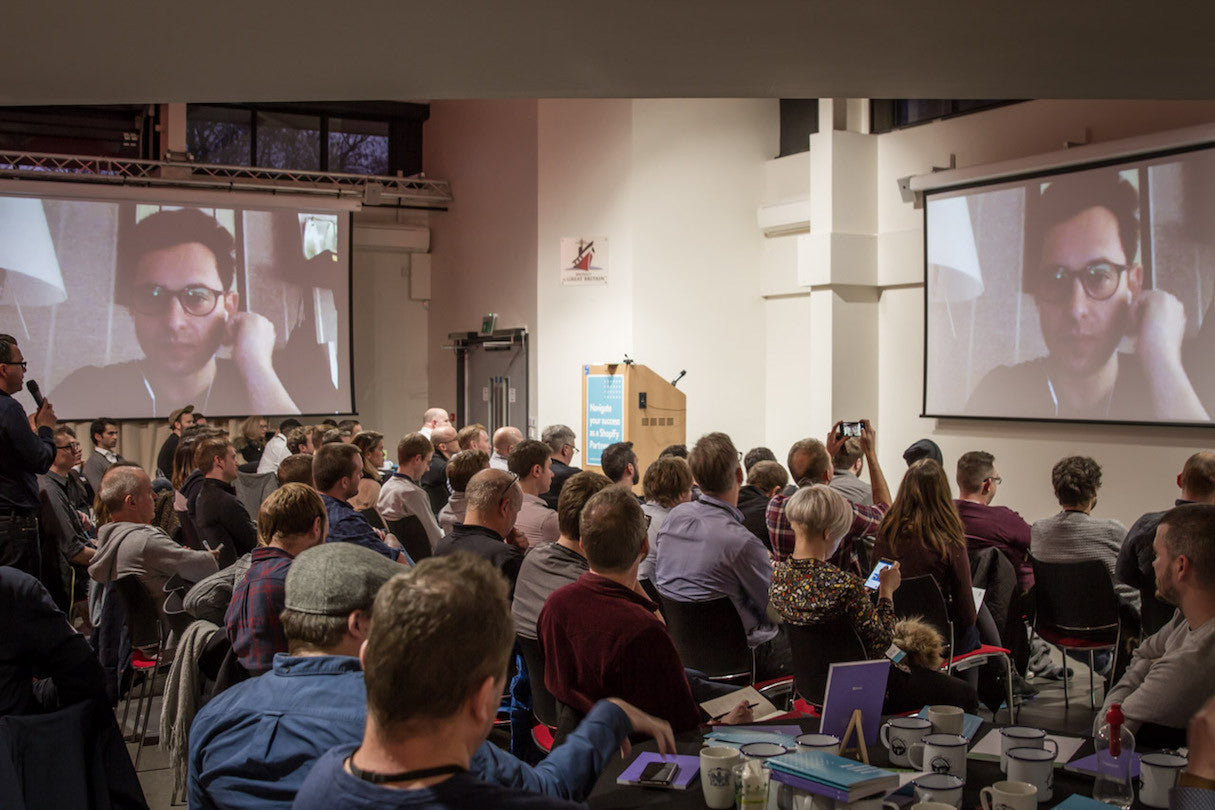
A community making connections
A Day With Shopify was a great opportunity to meet other Shopify Partners, learn more about the Shopify platform, and answer some of the big questions around running a successful web design or development business.
“We came to meet like-minded individuals who have been working on the platform,” explained Luke Green from Inspira Digital. “There was a really good community vibe. It helps us understand that we’re all doing something very powerful on Shopify.”
For all the photos of A Day with Shopify, see Marc Thiele’s Flickr album.
Interested in learning more about what Shopify has been up to? Browse through some recent Shopify news.
Read more
- Shopify's Web Design and Development Blog in Review: The Top 10 Articles of 2018
- Meet the New Residents of the Shopify Partner Accelerator
- Unite 2018 Keynote Roundup: Bringing Commerce to Everyone, Everywhere
- The Shopify Partner Program 2.0 — A Partnership You Can Build On
- Growing Together: A Look Back on the Shopify Partner Studio NYC
- What Does Design Mean to You? Enter Shopify + Dribbble’s Design Contest
- New York, Mexico City...Where Will the Shopify Partner Studio Go Next?
- What's New at Shopify: September 7, 2018
- Commerce+ 2021: A Recap of What’s Next in Commerce
- Happy Holidays! Year in Review

